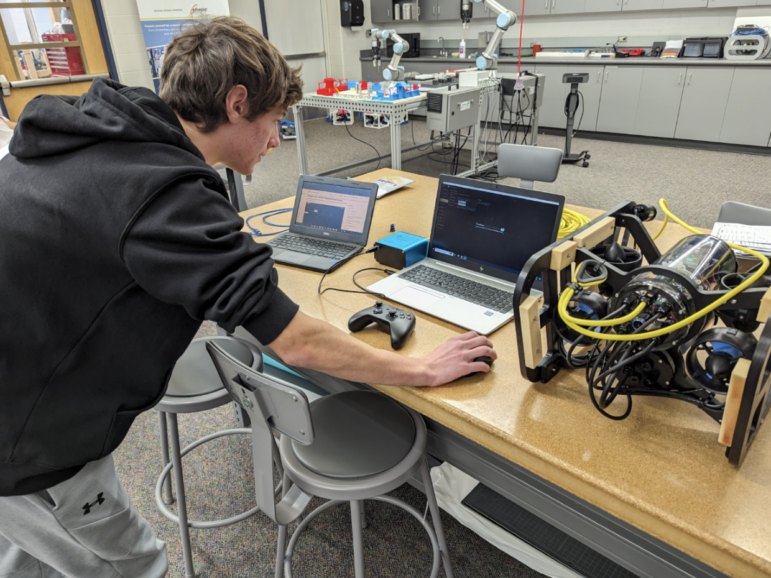
Courtesy photo
A student in the PRIME program at Grand Haven High School.By SOPHIA CERU
Capital News Service
LANSING – The Michigan Manufacturers Association plans to expand its Partnership Response in Manufacturing Education program, or PRIME, into more high schools throughout the state.
“This is an initiative that was created to bring engineering to schools. (Manufacturers) were focusing a lot on the colleges and realizing that there wasn’t a lot of preparation in the K-12 arena,” said Bill Rayl, the association’s executive director of workforce solutions.
“In a nutshell, it is high-tech shop class coming back into the high schools,” he said.
The program offers schools free access to modern equipment, specialized curricula, teacher professional development and scholarships for students who finish the program.
There are 33 participating high schools now, including schools in Grand Haven, Bay City, Alpena, Cheboygan, Hancock, Rudyard, Southfield, Holland, Pontiac and Three Rivers. Traverse City will be joining the list later this year.
The manufacturers’ group expects participating schools to reach 50 by the end of the year.
The association “created a strong partnership with the SME Education Foundation in 2021 to help expand PRIME schools in the state,” Rayl said.
The program was founded in 2011 to help implement manufacturing and engineering programs in high schools nationwide.
David Worthams, the director of employment policy for the manufacturers’ association, said, “Programs like PRIME are needed because there’s a big talent gap.”
“If you want to focus just on manufacturing and the talent gap that we’ve got nationwide, you’re talking about a $3 billion loss of productivity because we are not able to fill positions” in the manufacturing sector, Worthams said.
Rayl said the association surveys manufacturers about their needs.
His job includes working with manufacturers and economic development, workforce development and community development partners “to build employer-like collaboratives around those schools so that they can be sustainable for decades to come.”
“The program gives participants a broader understanding of manufacturing skills so that when they graduate, they have enough experience to continue their education or start a job or apprenticeship,” he said.
“There’s a lack of awareness on behalf of young people about these careers and what they mean, how much they pay and how you get the skills necessary to get those careers,” Rayl said.
Grand Haven High School has already implemented a trade skills curriculum in partnership with local manufacturer Shape Corp.
Worthams said students get a special note on their transcript that they went through the program and “can hit the ground running with an apprenticeship at Shape Corp. as soon as they graduate.”
“When folks hear about that story, they want to bring a PRIME school there,” he said.
Jeremy Case, a technical education teacher at Grand Haven High School, said PRIME offers “a plethora of benefits for students.”
“Because of being in the PRIME program every year, I have had at least one student who has received a nice healthy scholarship,” he said.
Case said his students engage in project-based learning and prototype design.
“It is an even deeper dive into project-based design engineering. It is very much a pre-engineering program which introduces students to advanced manufacturing capacity,” he said.
“I have had the great pleasure of having many students go to four-year universities pursuing a variety of engineering degrees, and they would say that the reason was those classes,” Case said.